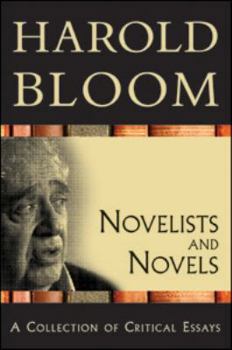Novelists and Novels
Select Format
Select Condition 
Book Overview
Read what Bloom had to say on the world's great novelists including Miguel de Cervantes, Charles Dickens, Jane Austen, Franz Kafka, Ernest Hemmingway and more. Ages 16+. This description may be from another edition of this product.
Format:Paperback
Language:English
ISBN:0791097277
ISBN13:9780791097274
Release Date:October 2007
Publisher:Checkmark Books
Length:588 Pages
Weight:2.00 lbs.
Dimensions:1.4" x 6.2" x 9.2"
Customer Reviews
2 ratings
Harold's Bloom
Published by Thriftbooks.com User , 16 years ago
Why do we read books about books and their writers? Such books at the basic level provide a synopsis of the books under study; the books are usually about classics (for example, "The Book of Great Books", ed. W John Campbell, 1977 Metro Books). So, a young reader or someone who has recently found joy in reading will be grateful for books that help him choose his next book. Years later, the more matured reader will like to see what others think of the books he reads. So he looks to books about books at a higher level - those that provide some analysis or even just some extra information even though that may only be the literary equivalent of "The Making of" genre in films and the telemedia. At the apex, the writers of books about books write only about one book. Northrop Frye's "The Great Code" (1982 Harvest Book) a treatise with the Bible and literature as its theme and subject is a splendid example. In fact, Frye wrote not one but two books about the same book; his second was "Words with Power" (1990 Harvest Books). "Novelists and Novels" ("N & N") is an in-between kind of book about books. The cynic may at once think that this is the kind of book that neither the novice nor mature reader will bother with. On the contrary, N and N is a beautiful bridge that crosses from the basic to the sublime. The friendship of Don Quixote and Sancho Panza, an essence of Miguel Cervantes's epic, was analysed in just over a page. Dickens' various works were discussed in 15. N & N invites a mature and experienced reader who has read some, if not most or all, of the books discussed. It is also a book for the reader who has views of his own; and for him to see what sort of mirror N & N is to him. Would it be a clear and identical reflection or a misshapen one contorting the reader's image? Bloom did not choose only the conventionally accepted "best" or "greatest" work of the writers under study (an exercise that is bound to be controversial anyway). When he wrote "Hesse" he wrote about "The Glass Bead Game", not "Steppenwolf" or "Siddhartha". His 21 pages of Kafka devoted only four to "The Trial", arguably Kafka's best known work. Bloom's bias shows through in many ways. It is obvious he lavishes Faulkner and patronizes Hemingway. It is a vast collection of essays on some of the finest writers and their works. In that regard, Philip Roth might have found himself a stranger in a strange land, but Bloom saved him that embarrassment with a splendid essay on Roth's "Zukerman Bound". Finally, reverting to my earlier point, would I recommend this to the novice or young reader? Absolutely - one cannot dream of flying without gazing at the sky.
Thoughtful and exciting
Published by Thriftbooks.com User , 16 years ago
These thoughtful essays on the classics of Western literature will be thoroughly enjoyed by book lovers. I particularly enjoyed the ones on Emily Bronte and Kate Chopin. Bloom discusses diverse writers ranging from Cervantes to Stendahl to Amy Tan. Because Bloom has valuable views on fantasists and their place in contemporary literature, anyone interested in science fiction and fantasy should definitely read this book. One of the essays is on Ursula K. Le Guin.





